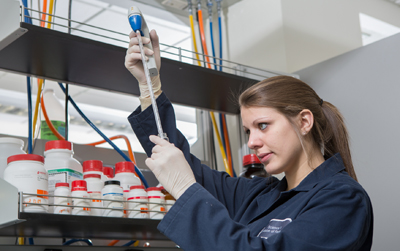
Student aids in hunt for Parkinson’s treatment
Joy Hallmark began conducting research in high school. Now, she studies treatments for Parkinson’s disease in a Binghamton University laboratory.
Parkinson’s is treated with a compound called Levodopa, or “L-dopa,” which causes abnormal involuntary motions after prolonged use.
Hallmark works with Christopher Bishop, an associate professor of psychology, to test several compounds that may allow Parkinson’s to be treated without this side effect. They rely on an animal model, observing the effects different Parkinson’s treatments have on rats’ body movements.
“The thing that attracted me most about this research was the fact that it was translational, so what you do in the lab applies in the field,” says Hallmark, who plans to pursue a doctorate or go to medical school after graduation. “We take what we’re learning now, and we can apply it by making new drugs and helping people.”
For the past year, Hallmark has been researching two compounds to see how they would affect Parkinson’s patients. As a part of the Undergraduate Research Center’s Summer Scholars and Artists program, Hallmark completed an eight-week fellowship with a postdoctoral student studying the serotonin system and its relationship to Parkinson’s.
“I’ve always had an interest in neurodegenerative disorders, so it was cool to come here and find Dr. Bishop’s lab and be able to take my interest a step further,” Hallmark says.
When she was in high school, the Queens native studied Alzheimer’s disease for three years at the Albert Einstein College of Medicine as part of the Intel Science Talent Search program.
Hallmark’s “prolonged interest” in medicine began even before that, though. “From a young age, I always wanted to be challenged,” she says. “I used to sit in the medical section at Barnes & Noble and just read the medical dictionary and learn new terms that I didn’t know.”
Bishop says Hallmark seemed like a great fit for his lab when they first met, and her work since has been “a testament to that fit.”
“She has demonstrated a commitment and growing knowledge base that has made her not only increasingly autonomous, but a true asset,” Bishop says. “Joy has proven herself to be an excellent young scientist, and her trajectory is outstanding.”
Hallmark says her passion for studying neuroscience stems from her curiosity and her willingness to explore uncharted territories. “The brain, I think, is just so intricate and there are so many things that we have yet to know about it,” she says. “I love going into the unknown and trying to figure things out.”







